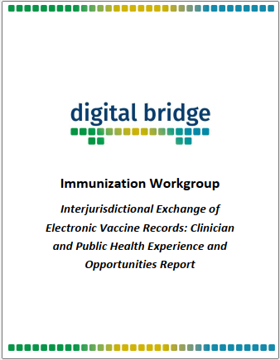 In early 2025, the Digital Bridge Immunization Workgroup engaged HLN Consulting to conduct a series of qualitative interviews with clinicians and public health stakeholders to explore the current status of interjurisdictional, electronic immunization data sharing. This effort was used to augment prior interviews facilitated by the Illinois Public Health Institute (IPHI) and culminated in a collaborative and cohesive report with recommendations for future consideration by the immunization community.
In early 2025, the Digital Bridge Immunization Workgroup engaged HLN Consulting to conduct a series of qualitative interviews with clinicians and public health stakeholders to explore the current status of interjurisdictional, electronic immunization data sharing. This effort was used to augment prior interviews facilitated by the Illinois Public Health Institute (IPHI) and culminated in a collaborative and cohesive report with recommendations for future consideration by the immunization community.
The purpose of the report was to summarize and document successes, challenges, and the overall experience of electronically sharing immunization records across state or jurisdictional borders from the clinicians’ and public health perspective. The report also highlighted opportunities for improvement and raising awareness as to the benefits of electronic data exchange via the Immunization (IZ) Gateway.
Though a recent decision was made to cease Digital Bridge operations and archive its assets, the report was added to the Digital Bridge website for public access as a testament to Digital Bridge’s commitment in promoting bidirectional information exchange between healthcare and public health. After initially focusing on electronic case reporting (eCR) – including the Reportable Condition Knowledge Management System (RCKMS) in 2014 – the Digital Bridge explored other potential use cases to promote interjurisdictional, electronic data exchange among Immunization Information Systems (IIS).
Research indicates the importance of sharing immunization data across jurisdictions as growing numbers of United States citizens move across state lines each year. As we experienced during the COVID-19 pandemic, enabling a patient’s medical record to follow them for continuity of care, including vaccination history, and to ensure they stay up-to-date with age-recommended vaccines to prevent disease, protects not only the individual, but their community, the country and the world population as well.
Between IPHI’s prior interviews and HLN’s more recent ones, a total of sixteen virtual interviews were conducted across ten organizations representing diverse stakeholders involved in immunization data exchange ranging from long-term care (LTC) to EHR vendors to schools and the Indian Health Service (IHS). Overarching themes raised by the interview participants included the recognition of IIS as a tool to support the provider’s daily workflow, particularly in primary care and pediatric settings, reliance on Electronic Health Records (EHR) and/or the IIS to look up patient vaccination records, the attempt made to locate missing records when vaccines were given outside of their organization or across state line, and improvements made in bidirectional exchange and interoperability standards.
Challenges in interjurisdictional, electronic data exchange were raised by the interviewees related to arduous onboarding processes, insufficient patient matching capability, and policy or legal limitations pertaining to acceptable partners and/or data for exchange. Areas of improvement were noted in terms of specific provider training, fully leveraging bidirectional data exchange functionality, opportunities to streamline workflows and manual processes, and establishing centralized access to out of state records and standardizing patient matching. Consensus among the interview participants highlighted the need for facilitating electronic exchange of immunization data across jurisdictions and states for completeness and accuracy of patient vaccination records, as well as easy access to high quality immunization data is essential for both patient and population level care.
There are a myriad of operational, technical, and policy-related limitations to efficiently retrieve patient immunization records beyond a provider’s state border. While progress has been made to establish bidirectional connections, providers still rely on manual processes and practices as part of their workflow, particularly in small practice settings. Most providers interviewed were not using EHR systems integrated with out-of-state systems, aside from a few large health systems that used Epic. The challenges and complexities raised through the interviews offered potential areas for improvement and considerations for future exploration.
Further insight into the provider interviews, findings and recommendations can be found in the Digital Bridge Immunization Workgroup – Interjurisdictional Exchange of Electronic Vaccine Records: Clinician and Public Health Experience and Opportunities Report.
